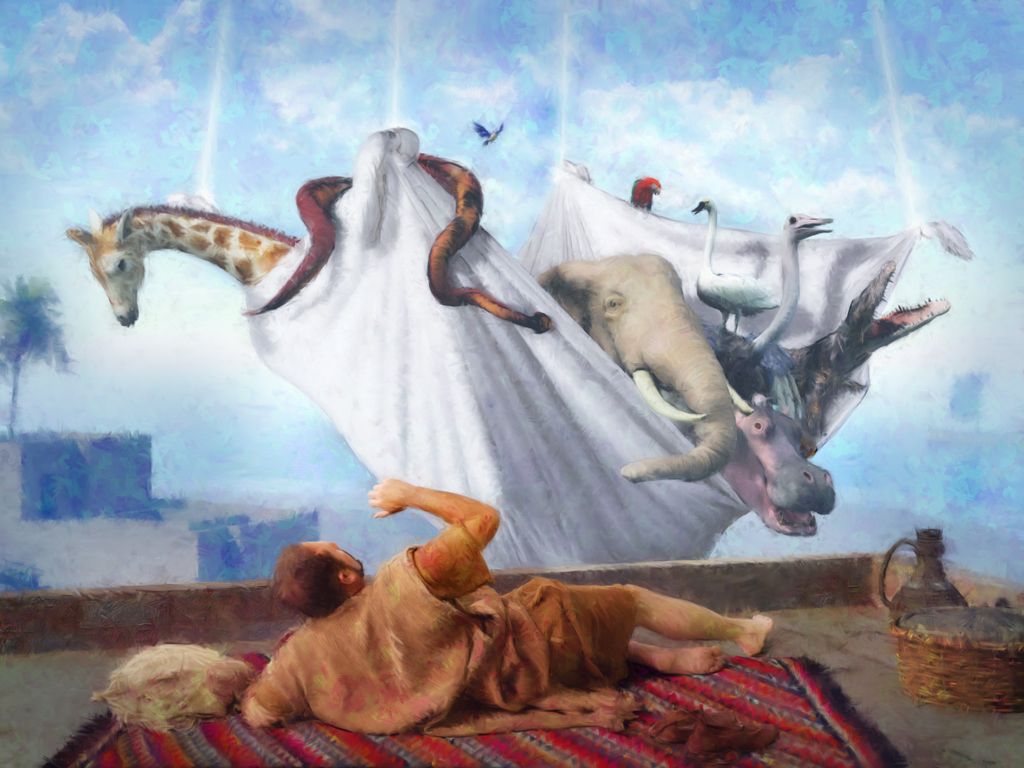
I was in the city of Joppa praying: and in a trance I saw a vision, A certain vessel descend, as it had been a great sheet, let down from heaven by four corners; and it came even to me: upon the which when I had fastened mine eyes, I considered, and saw fourfooted beasts of the earth, and wild beasts, and creeping things, and fowls of the air. And I heard a voice saying unto me, Arise, Peter; slay and eat. But I said, Not so, Lord: for nothing common or unclean hath at any time entered into my mouth. But the voice answered me again from heaven, What God hath cleansed, that call not thou common. And this was done three times: and all were drawn up again into heaven. — Acts 11.5-9
Dr. Jennifer Rosen, in her very good book, Finding Messiah, recycles a common Torah-observant interpretation of Peter’s vision of the great sheet let down from heaven with all manner of unclean animals and the command of God to “kill and eat”. The interpretation is quite simple: The point of the vision was not about food but about divisions between people, therefore it has no bearing on whether Gentiles or Jews should, or should not “keep Kosher”. This is just one of several ways that Torah-observant Messianic Jews and Gentiles account for what traditional Christian orthodoxy has interpreted as a confirmation of Jesus’ repeal of the Mosaic dietary laws. Another interpretation is that the vision was more inline with God’s command to Abraham to sacrifice Isaac; that is, not something that God actually intended him to do. God was just testing Peter… and making a point along the way; the same point that Dr. Rosen makes: It is not about the food.
This is a very weak argument. And I am being generous by calling it an “argument”. It really is an implied caricature of the traditional Chrisitan teaching on this text. Alleged “antinomians” have always been perfectly aware that the “point” of this vision was not about food. Dr. Rosen is not illuminating anyone except some imaginary foil. Although it is to her credit that she does not trot out the silliness that “Peter resisted the test”. Afterall, the text does say that it was a “vision”. Peter could not have actually “killed and eaten” even if he had been so feeble minded as to not know the difference between reality and a vision. However, to pursue this line of reasoning a little deeper, it should be noted that Galatians indicates that Peter had taken the vision to heart (and, I might add, to mouth) since Paul points out that he lived as do the Gentiles. Whether that means full blown eating non-kosher food or simply eating at the same table as Gentiles who were eating non-kosher food is beside the point. The point is that there is a clear and substantial difference between the Peter of Acts 10 and the Peter described in Galatians, and it is difficult to imagine that this difference had nothing to do with his vision. So apparently, for Peter, while the main point of the vision obviously wasn’t food, there was some point of it that was.
Ironically, the weakness of the argument that the point of the vision was not food is in how correct that observation actually is. Dr. Rosen is absolutely right… The point of the dietary laws is not food. See, she can’t have it both ways. One cannot argue that Peter’s vision has no bearing on what one was to actually eat, because food was just a metaphor for something deeper, and then in the same breath say that the point of the dietary restrictions of the Old Testament was food. This is not to say that she should choose one or the other, but rather that she is correct, and even if she were so inclined, she is not permitted to choose for the point to be about food. The point of the dietary laws is not food. The point is making a distinction between ethnicities. Jews differentiated themselves from Gentiles by, among many things, their dietary habits. The error of much of Judaism is to smooth away the sharp point of that reality by making it about food, not segregation. But it was not about food. It was always about segregation, differentiation, separation, distinction.
And when Peter saw that vision, it was, as Dr. Rosen argues, also not about food. It was about those divisions between people being erased. So it might seem that if that is the case, then the dietary laws stand. But that is to oversimplify the entire matter. The only reason for the dietary restrictions was to facilitate and illustrate the ethnic division. And since they were not about the food but the division, then once that division was removed, the dietary restrictions became worse than meaningless, they became vestiges of a segregated past that had been conquered and undone in Jesus the Christ of God. In the cross Jesus had slain all enmities and ordinances that prompted division and prevented unity (Col. 2.13-15). Just as the segregation that God required in the Old Covenant was not allowed independent of the metaphor of that division, namely separation laws; in the same way the unity of the New Covenant is not allowed independent of the violent repeal of those same laws through the cross of Israel’s Messiah.
Israel rejected their Messiah because he offered something that was offensive, scandalous to their belief system. That wasn’t simply that he “suffered” and that he died. In fact, it wasn’t that at all. Contrary to a relatively modern revisionist interpretation of passages like Isaiah 53 (The Suffering Servant), Jews had long understood that the Messiah would suffer for his people, and identified the Suffering Servant of Isaiah 53 as the Messiah. The offense of the cross is not so simplistic as just the fact that he hung on a cross, as if they were embarrassed that their Messiah couldn’t avoid that fate. The offense of the cross had to do with what else was nailed to that cross along with Jesus. According to Paul, it was the entire legal framework of the Old Covenant. That symbol of old creation was put to death so that God’s people, both Jew and Gentile, could become a new creation under a new covenant with an entirely new legal framework. That new legal framework was no longer graven in stone tablets and not only precluded ethnic divisions, but all divisions, be they economic, societal, or gender. In the Christ, there would be neither Jew nor Greek, neither bond nor free, neither male nor female, neither poor nor rich. Every mountain would be brought low, every valley would be filled in. There would be no more night, nor more sea. Every metaphor in the Old Covenant that pointed to division would be obliterated in the Messiah. The Messiah was not the envoy of the old order, but the forerunner of the New. And the new was not just the old redux. The new is an entirely reimagined reality. In the words of C.S. Lewis, the Old was merely a shadow of its latter self.
Much of traditional Chistianity suffers from a form of split-personality in this respect. Despite their objection to the laws of separation, they illogically wish to maintain the essence of those laws in their assumption that the work of the New Testament and the Holy Spirit is to divide the world, to separate the world. They view the separation of the Church from the world as the highest Christian virtue. Again, the problem here is simplism. They reason that the Church should not become the world, ergo the church must create, maintain, and boast of its division from the world. And the ultimate achievement of this virtue will be the rapture of the church from the world and the world’s total annihilation so as to never endanger the separateness of the church again. In this they concur with the Torah-observants: It truly isn’t about the food. But the truth is far less simplistic. It is true that the church must not conform to this world. However, our solution to this is not division. It is to continue the work of Christ in recreating the world. Not driving it away, but bringing it under the submission of Christ. From Babel until Christ, the world was bent on unification; God prescribed a provisional response of segregation consistent with the nature and power of the old law. But since Christ the world is bent on division and God is working unity by the new law, also given at Pentecost: his Spirit, whereby all are made one as Jesus prayed so passionately in John 17.

